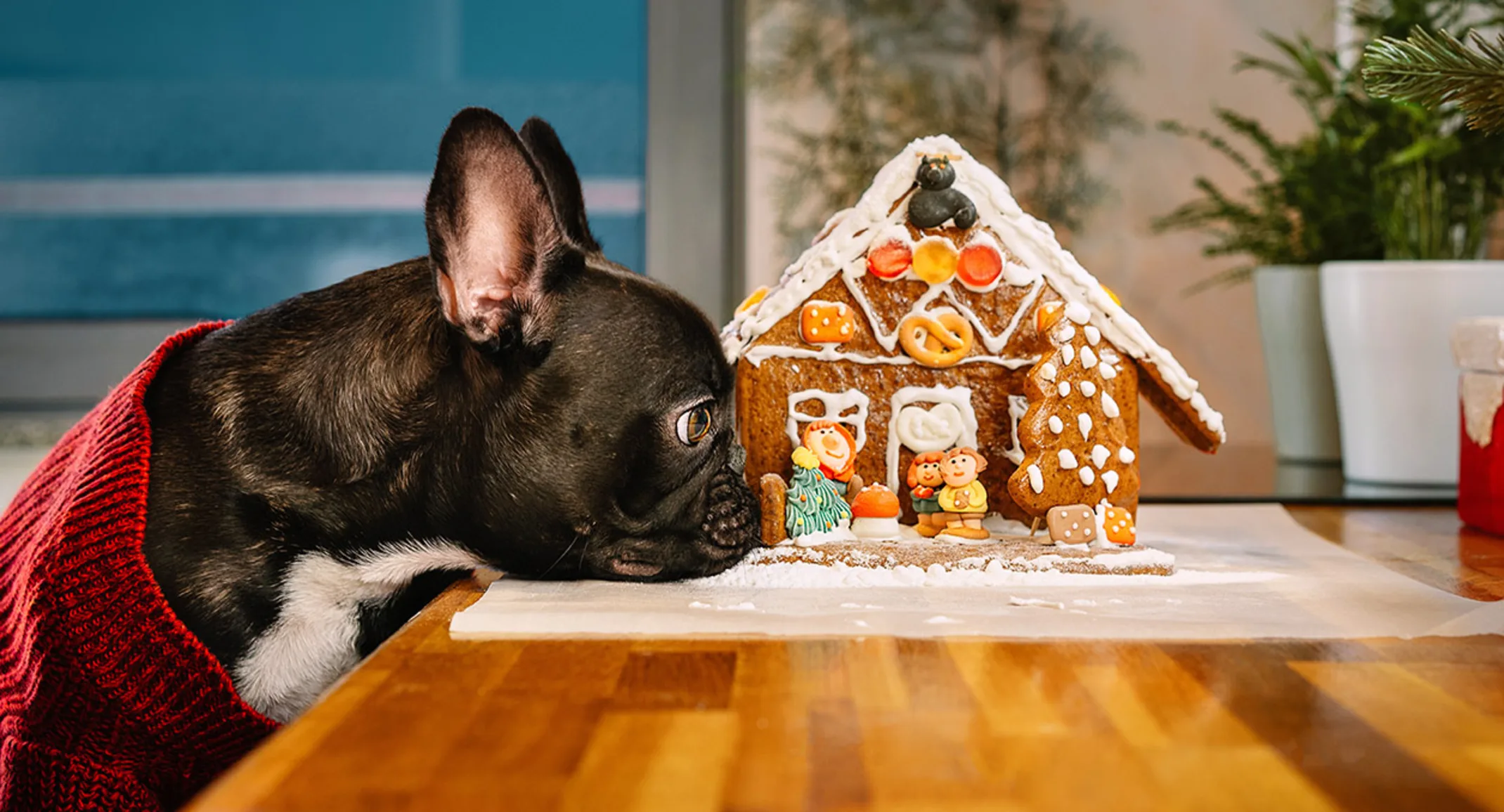How to Avoid a Holiday Pet Emergency
Tips and Tricks

The holidays are a time for fun with friends and family. Many of us view our pets as family and include them in all the festivities. While the holidays are full of excitement, they can also be hectic and stressful, which increases the risk of a holiday pet emergency. Keep your cats and dogs safe during the holidays by avoiding hazards and being prepared for a potential emergency. Follow these safety tips, and enjoy a stress-free, safe, and pet-friendly holiday season.
#1: Keep cats and dogs out of the kitchen
Holidays are synonymous with delicious foods, and where there’s food, there’s usually a pet waiting for something yummy to drop. While you and your guests may be tempted to share table scraps with your pet—those begging eyes are difficult to resist—many common holiday dishes contain ingredients that are dangerous for cats and dogs, including:
Chocolate — Chocolate, especially dark and baker’s chocolate, contains high amounts of theobromine, which can be dangerous for pets.
Onions — Many side dishes include onions, garlic, chives, and leeks. These ingredients can cause your pet’s red blood cells to break down, resulting in anemia.
Turkey — A staple of many holiday gatherings, turkey is delicious—but potentially deadly for pets. Cooked turkey bones are extremely brittle, splintering easily when your pet chews them, which can be a choking hazard, and the bone shards can injure their mouth or esophagus. Turkey skin, bones, and fat can wreak havoc on your pet’s gastrointestinal system and lead to pancreatitis.
Xylitol — Highly toxic, this natural sweetener and sugar substitute is used in many sugar-free baked goods.
Fatty foods — Fatty foods that have an abundance of butter, oil, and grease can cause your pet to develop pancreatitis.
Alcohol— When raising a toast this holiday season, ensure your pet does not imbibe. Pets are particularly sensitive to alcohol, and small amounts can result in alcohol toxicity.
Keep people food out of your pet’s reach, and put away leftovers quickly—before your curious cat steals them from the countertop. To deter your dog from getting into discarded food, take out the trash right away. If you suspect your pet has ingested a toxic substance, call the 24-hour Pet Poison Helpline or your veterinarian.
#2: Choose pet-friendly holiday decorations
You may have your heart set on Pinterest-worthy holiday decor, but remember curious cats and dogs often view any item you set out within their reach as an irresistible chew toy. Many holiday decorations are hazardous for your pet, so to avoid potential disaster when you decorate for the holidays, keep these tips in mind:
Poisonous plants — Many decorative plants, including holly, mistletoe, and poinsettias, are toxic to pets. Place these plants out of your pet’s reach, or opt for pet-friendly flowers.
Tinsel, ribbons, and ornaments — These shiny, festive features look like fun toys to your pets—string-like tinsel strands are especially tempting for cats—but if ingested, tinsel and ornaments can cause stomach upset. In addition, tinsel and ribbon can wrap around your pet’s intestines, and require surgical intervention. Broken glass ornaments can cause internal bleeding, so hang your most delicate ornaments high on your Christmas tree—out of your pet’s reach.
Electrical cords — Prevent your pet from chewing live (i.e., plugged-in) electrical cords, which can cause serious injuries such as burns and electrical shock. Always keep a close eye on your pet when holiday decorations are plugged in.
Christmas tree — Secure your tree so your pet cannot knock it over, and limit your pet’s access to the tree if they chew on branches. Ingested pine needles can puncture your pet’s intestinal tract and cause obstruction.
#3: Consider your pet when entertaining
If you will be hosting a holiday gathering at your home, think about your pet’s wellbeing during party planning. Cats and dogs can feel stressed by a party’s unfamiliar people, loud noises, and excitement To ensure your pet’s safety when you are focusing on your guests, do the following:
Create a safe space — If your pet prefers to avoid mingling with party guests, ensure they have access to their own area—with music or television providing background noise—such as a quiet room or their kennel, where they can retreat from the hubbub. You can also ease your pet’s party anxiety by providing them with plenty of engaging toys to keep them distracted.
Watch the exits— If your pet is free to roam during the party, keep an eye on them when people are entering or leaving your home, so your furry companion does not slip out when you are distracted. Ensure your pet is microchipped and has proper, current identification tags if they do get out.
Curb counter surfing — Unattended food is a counter-surfing pet’s dream. Food dishes should always be kept out of your pet’s reach, and remind your guests not to give your pet table scraps.
#4: Travel safely with your pet
If your holiday plans involve traveling with your pet, ensure your pet is ready long before your trip. Prepare your pet for holiday traveling by doing the following:
Schedule a veterinary visit — Before your trip, consult with your veterinarian to ensure your pet is healthy enough to travel. Your veterinarian can recommend calming supplements or motion-sickness medications, and provide your pet’s health certificate, vaccination, and medical records.
Consider boarding your pet — Some pets do not travel well, and are more comfortable being boarded or cared for by a close friend or family member. If you will be boarding your pet, find out which records and vaccinations the facility requires, and book your reservation far in advance.
Keep your pet secure — Always restrain your pet appropriately in a carrier or with a secure harness while traveling, and use a leash when walking your pet in public.
Pack your pet’s bags — Do not assume you can purchase your pet’s necessary gear when you arrive at your destination. Pack your pet’s essentials, including:
Food
Treats
Bowls
Toys
Bedding
Travel crate
Litter and litter box
Waste bags
Current identification
Pet first-aid kit
Vaccination records
Prescription medications
To avoid potential pet emergencies during the holiday season, follow our safety tips, but keep in mind that unforeseen situations can occur. If your pet experiences an emergency, use this locator to find the emergency veterinary hospital closest to you.
